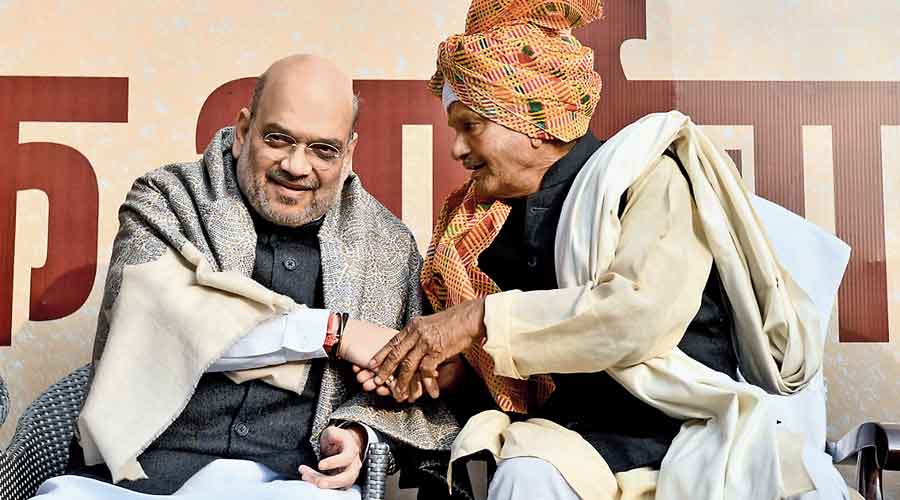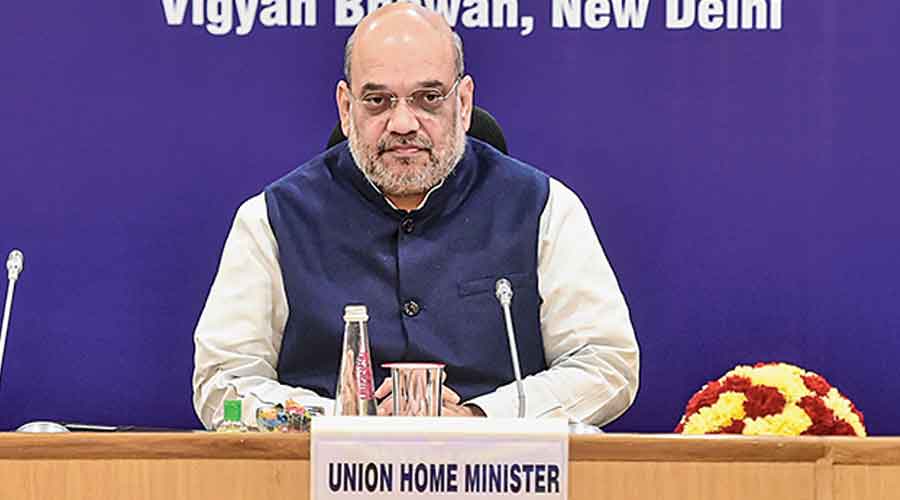Union home minister Amit Shah appears to have received multiple rebuffs so far to his efforts to court the crucial Jat vote bank of western Uttar Pradesh ahead of the heartland Assembly polls.
Shah had got two Jat MPs from his party — Parvesh Verma and Sanjeev Balyan, also Union minister of state for animal husbandry — to call a meeting of Jat leaders at Verma’s New Delhi home on Wednesday.
Verma had launched into a hate rant against the Shaheen Bagh movement during the anti-CAA agitation. Balyan is accused of helping incite the 2013 Muzaffarnagar riots, which pit Jat against Muslim in western Uttar Pradesh and created a political climate that helped the BJP not just sweep the state’s constituencies but grab power at the Centre in 2014.
However, with the recent yearlong farmers’ movement against three central laws appearing to weaken Jat support for the BJP, Shah was keen to appease the agrarian community.
Over 200 Jat representatives were said to have attended the “closed-door” meeting in Delhi. Sources said that Shah had, as a mark of “respect” for the Jats, left the president’s chair for Jat leader Jaiveer Singh.
“But the Chaudharies (heads) of as many as 28 of the 32 khap panchayats (traditional caste councils) spread over western Uttar Pradesh’s ‘Jatland’ failed to turn up at the meeting,” a source close to Jaiveer said. “And the four khaps that attended the meeting were represented by second or third-rung functionaries, not the Chaudharies.”
Shah received a second snub when Rashtriya Lok Dal (RLD) president Jayant Chaudhary — son of the late Ajit Singh and grandson of former Prime Minister and Jat titan Chaudhary Charan Singh — spurned his offer to tie up with the BJP.
Shah had got Balyan to make the offer to Jayant over the phone from the meeting, the sources said.
Jayant later tweeted: “You (Shah) shouldn’t invite me; you should have invited 700+ farmers’ families whose homes you have destroyed.”
Farmer unions have claimed that 700 protesters died during the yearlong farmers’ agitation.
Balyan refused to comment on Jayant’s tweet but told this correspondent in response to a question: “Both Prime Minister Narendra Modiji and home minister Amit Shahji are ready to listen to Jayant Chaudharyji and our Jat brothers. The BJP is their home. The party’s doors are open for them without any condition.”
The RLD, heavily influential among the farmers of western Uttar Pradesh, has struck an alliance with the Samajwadi Party of Akhilesh Yadav, which enjoys wide Muslim support and is the BJP’s biggest challenger in the state.
The development lends credence to the theory that the farmers’ agitation has at least partly repaired the Jat-Muslim divide wrought by the 2013 riots.
“The Jat farmers from Uttar Pradesh, Haryana, Rajasthan and Punjab were at the centre of the farmers’ movement,” RLD national general secretary Trilok Tyagi told this correspondent.
“Prime Minister Narendra Modi had described them as ‘parjeevi, andolanjeevi (parasites, professional agitators)’, and other BJP leaders and cadres had abused them as ‘Khalistani, atankvadi (terrorist) and deshdrohi (anti-national)’. Does Shah think the Jats and farmers would forget the insults? They won’t ever. The BJP will be wiped out from western Uttar Pradesh.”
Tyagi claimed: “Not a single khap representative attended (Wednesday’s) meeting. They were all BJP cadres drawn from Delhi and elsewhere.”
Shah, who is managing the BJP campaign in Uttar Pradesh, is said to be the “architect” of the party’s triumph from the state in the 2014 general election and the 2017 Assembly polls. Jat support had helped immensely in both these elections.
“But the farmers’ agitation has brought the Jats and Muslim farmers together and the RLD — the party of the Jats — and the Samajwadi Party have struck an alliance. The BJP faces bleak prospects in this situation,” said Affaq A., a college teacher from the region.
Sudhir Kumar Panwar, a Lucknow University professor and former Planning Commission member, provided the historical perspective.
“The khap panchayats are traditional social councils of the Jats, and Chaudhary is a hereditary position. But decisions are taken collectively with the Chaudhary engaging the gotra (clan) elders,” he said.
“Earlier, the khap panchayats would deal only with social issues such as customs and rituals. But the powerful farmers’ leader, Mahendra Singh Tikait — father of Bharatiya Kisan Union spokesman Rakesh Tikait — involved the khap panchayats in political decisions and in a way made the panchayats politically inclined.”
The Jats’ khap panchayats played a big role in the farmers’ movement. BKU leader Naresh Tikait is the Chaudhary of a khap. Many elderly Chaudharies had joined the dharna on the Delhi-Ghaziabad border and the government had used force to remove them.
In protest against the police action, the farmers had convened a “Sarva Khap Panchayat” (larger council) meeting in Lucknow on January 31 last year. It was attended by Chaudharies from Punjab, Rajasthan and Haryana besides those from Uttar Pradesh, bolstering the farmers’ agitation.
“The Jats and their khap panchayats rejecting the BJP is just one part of the challenges the ruling party faces in the run-up to the 2022 Assembly elections,” Panwar said.
“Apart from the communal voting that had helped the BJP in 2014 and 2017, the party had also secured votes from the youth who were, across social strata, looking for job opportunities and a better life.
“Narendra Modi was a fresh face and marketed his Gujarat as a dreamland, creating hope among the youth. He promised heaven — 1.5 crore jobs every year and a doubling of farmers’ incomes. The party also rode the anti-incumbency against the Manmohan Singh government in 2014 and against Akhilesh in 2017.
“But instead of delivering on the promises, Modi and chief minister Yogi Adityanath kept playing the Hindutva card, speaking in overtly sectarian tones, pitting Shivaji against Aurangzeb at the Kashi Vishwanath temple, raising the issue of the Mathura Krishna temple and targeting Pakistan and Mohammed Ali Jinnah.
“An additional 5 lakh people have dropped below the poverty line in Uttar Pradesh in the past five years. There’s unprecedented unemployment. The prices of essentials have skyrocketed. Apart from the farmers’ anger, these factors too will come into play.”
The Jat strongholds spread over the upper doaba districts of Muzaffarnagar, Shamli, Meerut, Baghpat and Bulandshahr will go to the polls in the first phase on February 10.












